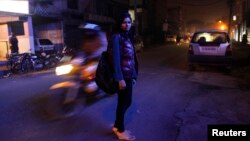NEW DELHI —
India needs to implement existing laws, not introduce tougher punishment such as the death penalty, to prevent rape, a government panel set up to review legislation said on Wednesday, following a brutal gang rape that shook the nation.
Panel head justice J.S. Verma rejected outright the idea of the death penalty for rape cases, a demand from some protesters and politicians in the days after the 23-year-old physiotherapy student was attacked on a moving bus.
"There was an overwhelming opinion against the death penalty, even women's groups opposed this," Verma told a news conference. This recommendation was in line with the opinions of rights organizations concerned harsh new laws would not solve the rising number of reported sexual assault cases in India.
Prime Minister Manmohan Singh asked Verma to look at possible amendments of criminal law in response to public anger after the rape and subsequent death of the student, who was assaulted with metal bars and dumped bleeding on a highway.
In that case, because the woman died of her injuries, the five accused have been charged with murder and face the death penalty if found guilty. The victim died of massive organ damage in a Singapore hospital two weeks after the attack.
Hearings in the case against the accused begin in a fast track sessions court on Thursday. The court must decide which of the prosecution's charges it will hear before a trial formally begins.
Separately, the Supreme Court is hearing a petition to move the case out of Delhi, after one of the accused said strong public opinion in the city would prejudice the case.
Verma said he was shocked to hear top government officials congratulate the Delhi police chief's handling of the case, when, he said, police negligence was to blame for a climate of insecurity in New Delhi, known as India's "rape capital."
"Practically every serious breach of the rule of law can be traced to the failure of performance by the persons responsible for its implementation," the recommendations submitted to the government by Verma on Wednesday stated.
The report said the failure of public functionaries responsible for traffic regulation and law and order enabled the Delhi gang rape, and said the case had revealed "officials' low and skewed priority of dealing with complaints of sexual assault".
He also rejected lowering the age juveniles can be tried as adults, a demand from some politicians and protesters. A sixth accused in the case has told police he is under 18, meaning he would face a maximum three year sentence if found guilty.
The panel did recommend other milder forms of sexual harassment be more strictly legislated against and punished.
"Sexual assault degenerates to its gravest form of rape beginning with uncontrolled sexual harassment in milder forms, which remain uncontrolled. It has, therefore to be curbed at the initial stage."
Panel head justice J.S. Verma rejected outright the idea of the death penalty for rape cases, a demand from some protesters and politicians in the days after the 23-year-old physiotherapy student was attacked on a moving bus.
"There was an overwhelming opinion against the death penalty, even women's groups opposed this," Verma told a news conference. This recommendation was in line with the opinions of rights organizations concerned harsh new laws would not solve the rising number of reported sexual assault cases in India.
Prime Minister Manmohan Singh asked Verma to look at possible amendments of criminal law in response to public anger after the rape and subsequent death of the student, who was assaulted with metal bars and dumped bleeding on a highway.
In that case, because the woman died of her injuries, the five accused have been charged with murder and face the death penalty if found guilty. The victim died of massive organ damage in a Singapore hospital two weeks after the attack.
Hearings in the case against the accused begin in a fast track sessions court on Thursday. The court must decide which of the prosecution's charges it will hear before a trial formally begins.
Separately, the Supreme Court is hearing a petition to move the case out of Delhi, after one of the accused said strong public opinion in the city would prejudice the case.
Verma said he was shocked to hear top government officials congratulate the Delhi police chief's handling of the case, when, he said, police negligence was to blame for a climate of insecurity in New Delhi, known as India's "rape capital."
"Practically every serious breach of the rule of law can be traced to the failure of performance by the persons responsible for its implementation," the recommendations submitted to the government by Verma on Wednesday stated.
The report said the failure of public functionaries responsible for traffic regulation and law and order enabled the Delhi gang rape, and said the case had revealed "officials' low and skewed priority of dealing with complaints of sexual assault".
He also rejected lowering the age juveniles can be tried as adults, a demand from some politicians and protesters. A sixth accused in the case has told police he is under 18, meaning he would face a maximum three year sentence if found guilty.
The panel did recommend other milder forms of sexual harassment be more strictly legislated against and punished.
"Sexual assault degenerates to its gravest form of rape beginning with uncontrolled sexual harassment in milder forms, which remain uncontrolled. It has, therefore to be curbed at the initial stage."








